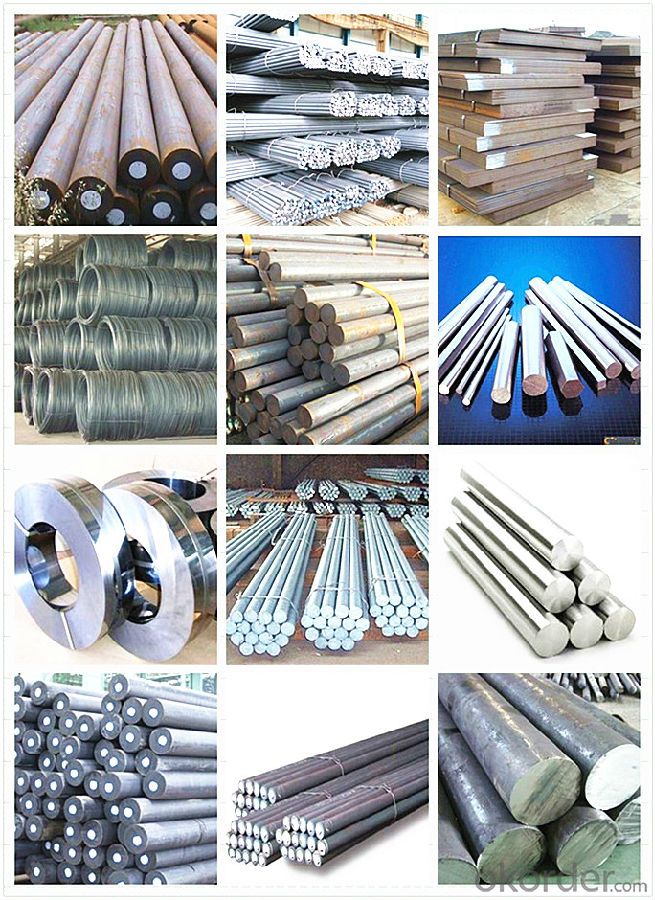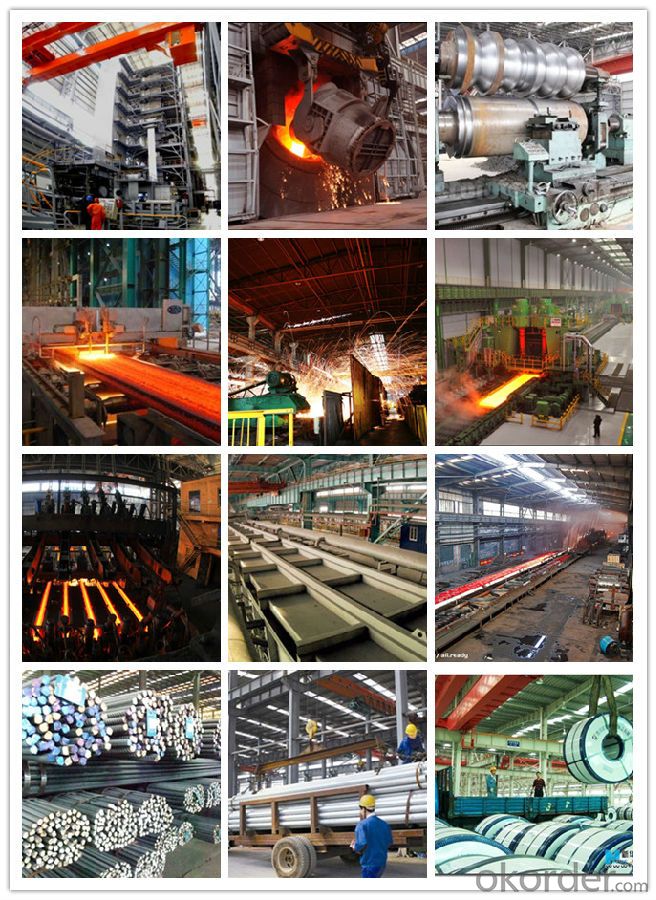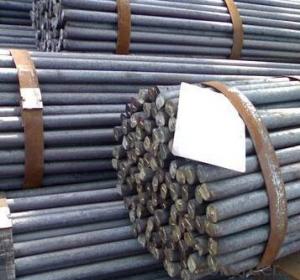Special Steel Reinforcing Steel Bars HRB355 Rebars
- Loading Port:
- China main port
- Payment Terms:
- TT OR LC
- Min Order Qty:
- 30 m.t.
- Supply Capability:
- 10000 m.t./month
OKorder Service Pledge
OKorder Financial Service
You Might Also Like
Item specifice
Product Information
Chemical composition
Grade | Technical data of the original chemical composition (%) | |||||
C | Mn | Si | S | P | B | |
HRB335 | ≤0.25 | ≤1.60 | ≤0.80 | ≤0.045 | ≤0.045 | >0.0008 |
Physics capability | ||||||
Yield Strength (N/cm2) | Tensile Strength (N/cm2) | Elongation (%)
| ||||
≥335 | ≥490 | ≥16 | ||||
3.Theorectical weight
Diameter (MM) | Cross Sectional Area (MM2) | Theorectical Weight (KG/M) | Weight of 12M Bar (KG) | A Ton Contains 12M Bars (PCS) |
6 | 28.27 | 0.222 | 2.664 | 375.38 |
8 | 50.27 | 0.395 | 4.74 | 210.97 |
10 | 78.54 | 0.617 | 7.404 | 135.06 |
12 | 113.1 | 0.888 | 10.656 | 93.84 |
14 | 153.9 | 1.21 | 14.52 | 68.87 |
16 | 201.1 | 1.58 | 18.96 | 52.74 |
18 | 254.5 | 2 | 24 | 41.67 |
20 | 314.2 | 2.47 | 29.64 | 33.74 |
22 | 380.1 | 2.98 | 35.76 | 27.96 |
25 | 490.9 | 3.85 | 46.2 | 21.65 |
28 | 615.8 | 4.83 | 57.96 | 17.25 |
32 | 804.2 | 6.31 | 75.72 | 13.21 |
36 | 1018 | 7.99 | 98.88 | 10.43 |
40 | 1257 | 9.87 | 118.44 | 8.44 |
Product Show

Workshop Show

Shipping
1. FedEx/DHL/UPS/TNT for samples, Door-to-Door;
2. By Air or by Sea for batch goods, for FCL; Airport/ Port receiving;
3. Customers specifying freight forwarders or negotiable shipping methods!
Delivery Time: 3-7 days for samples; 5-25 days for batch goods.
Payment Terms
1.Payment: T/T, L/C, Western Union, MoneyGram,PayPal; 30% deposits; 70% balance before delivery.
2.MOQ: 1pcs
3.Warranty : 3 years
4.Package Informations: 1) EXPORT, In 20 feet (GW 25 ton) or 40 feet Container (GW 25 ton)
2)as customer's requirement
Why choose us?
(1) The leading exporter in China special steel industry.
(2) Large stocks for various sizes, fast delivery date.
(3) Good business relationship with China famous factories.
(4) More than 7 years steel exporting experience.
(5) Good after-sales service guarantee.
- Q:What are the different cutting tools used for machining special steel?
- Some different cutting tools used for machining special steel include carbide inserts, high-speed steel (HSS) end mills, diamond-coated tools, and ceramic cutting tools. These tools are designed to withstand the high hardness and heat resistance of special steels, ensuring precise and efficient cutting operations.
- Q:What are the different corrosion protection methods used for special steel?
- There are several corrosion protection methods used for special steel to ensure its durability and longevity. These methods include: 1. Coatings: Applying various types of coatings, such as paint, epoxy, or zinc, can provide a protective layer on the steel surface. These coatings act as a barrier, preventing moisture and corrosive elements from coming into direct contact with the steel. 2. Galvanization: Galvanizing is a process that involves coating the steel with a layer of zinc. This creates a sacrificial barrier, as the zinc corrodes instead of the steel. Galvanized steel is commonly used in outdoor applications, such as fences, poles, and roofing. 3. Stainless steel: Special steel can also be manufactured using stainless steel, which contains a high percentage of chromium. Chromium forms a passive layer on the surface of the steel, providing excellent corrosion resistance. Stainless steel is widely used in industries such as construction, food processing, and medical equipment. 4. Cathodic protection: This method involves creating an electrical current or using sacrificial anodes to protect the steel. By introducing a more reactive metal (sacrificial anode) or applying an electrical current, corrosion is minimized as the reactive metal corrodes instead of the steel. 5. Alloying: Modifying the composition of the steel by adding elements like nickel, molybdenum, or copper can enhance its resistance to corrosion. These alloying elements form a protective layer on the surface, making the steel more resistant to rust and other forms of corrosion. 6. Passivation: Passivation is a chemical process that removes free iron from the surface of the steel and forms a protective oxide layer. This layer acts as a barrier against corrosion, enhancing the steel's resistance to rust and other forms of corrosion. 7. Proper maintenance: Regular inspection, cleaning, and maintenance of special steel are essential in preventing corrosion. Removing dirt, debris, and other contaminants from the steel's surface can help maintain its protective coatings and prevent corrosion from occurring. It is important to select the appropriate corrosion protection method based on the specific application and environmental conditions to ensure the long-term performance and durability of special steel.
- Q:How does special steel contribute to reducing product rejection rates?
- Special steel contributes to reducing product rejection rates by providing superior strength, durability, and resistance to corrosion. This ensures that the manufactured products meet the required specifications and perform optimally, reducing the likelihood of rejection due to quality issues. Additionally, special steel's precise composition and enhanced mechanical properties enable more accurate and consistent manufacturing processes, minimizing variations and defects that could lead to product rejection.
- Q:What are the applications of special steel in the marine sector?
- Special steel is extensively used in the marine sector due to its unique properties. It is used in various applications such as shipbuilding, offshore platforms, and marine equipment manufacturing. Special steel provides excellent corrosion resistance, high strength, and durability, making it ideal for marine environments that are highly corrosive and subject to extreme conditions. It is used for constructing hulls, propeller shafts, pipelines, and various components of ships and offshore structures. Additionally, special steel's ability to withstand impact and fatigue makes it suitable for marine applications where safety and reliability are crucial.
- Q:What are the main advantages of using special steel in the automotive industry?
- Special steel offers several advantages in the automotive industry. Firstly, it provides enhanced strength and durability, ensuring the safety and reliability of vehicles. Secondly, special steel is lightweight, contributing to fuel efficiency and reducing carbon emissions. Additionally, it offers excellent formability and weldability, allowing for complex and intricate designs. Lastly, special steel possesses high corrosion resistance, extending the lifespan of automotive components and reducing maintenance costs. Overall, the use of special steel in the automotive industry enhances performance, efficiency, safety, and longevity.
- Q:What are the different tool steel alloys?
- Tool steel, a type of steel containing carbon and alloy, is specifically designed for producing tools, dies, and cutting applications. There are various tool steel alloys available, each possessing unique properties and characteristics. 1. Carbon Tool Steels: These steels have a higher carbon content, typically ranging from 0.60% to 1.00%. They provide excellent hardness, wear resistance, and toughness, rendering them suitable for cutting and forming tools. 2. High-Speed Tool Steels: These steels are engineered to endure high temperatures while maintaining their hardness and strength at elevated speeds. They usually contain alloying elements like tungsten, molybdenum, and vanadium. 3. Shock-Resistant Tool Steels: These steels are specially formulated to withstand high impact or shock loads without fracturing. They offer exceptional toughness and are frequently utilized for chisels, hammers, and other tools subjected to intense impact forces. 4. Hot-Work Tool Steels: These steels are designed to retain their hardness and strength at high temperatures, making them ideal for applications involving hot forming or forging processes. They exhibit outstanding thermal conductivity and wear resistance. 5. Cold-Work Tool Steels: These steels are specifically designed for applications involving cutting, shearing, and forming at room temperature or lower. They possess high hardness, wear resistance, and toughness, enabling them to withstand the stresses associated with cold-working operations. 6. Mold Steels: Mold steels are primarily used in the production of molds for plastic injection molding, die casting, and extrusion processes. They offer good machinability, high wear resistance, and excellent dimensional stability. 7. Stainless Tool Steels: Stainless tool steels combine the corrosion resistance of stainless steel with the hardness and toughness of tool steel. They are commonly used in applications where both wear resistance and corrosion resistance are required. These examples represent just a fraction of the tool steel alloys available in the market. Each alloy possesses distinct properties and applications, enabling manufacturers to select the most suitable tool steel for their specific requirements.
- Q:How does special steel contribute to the overall strength and durability of structures?
- Special steel contributes to the overall strength and durability of structures by providing enhanced mechanical properties such as higher tensile strength, improved corrosion resistance, and increased toughness. Its unique composition and manufacturing processes allow for greater load-bearing capacity, better resistance to wear and tear, and increased longevity. This makes it a crucial material in construction, engineering, and other industries where strength and durability are paramount.
- Q:What are the different surface treatment methods used for special steel?
- Some of the surface treatment methods used for special steel include electroplating, hot-dip galvanizing, powder coating, and nitriding.
- Q:What are the requirements for special steel used in packaging machinery?
- The requirements for special steel used in packaging machinery can vary depending on the specific application and the type of packaging machinery being used. However, there are some common requirements that are typically expected for this type of steel. Firstly, the special steel used in packaging machinery should have excellent corrosion resistance. This is because packaging machinery often comes into contact with various liquids, including water, oils, and cleaning solutions. Corrosion resistance helps to prevent the steel from deteriorating or rusting when exposed to these substances, ensuring the longevity and reliability of the machinery. Secondly, the steel should possess high hardness and wear resistance. Packaging machinery often involves moving parts and components that are subjected to constant friction and wear. Therefore, the steel used in these parts should be able to withstand the repetitive contact and abrasion without undergoing significant wear or deformation. High hardness also helps to prevent the formation of scratches or grooves on the surfaces, which can compromise the quality of the packaging. Additionally, the special steel should have good machinability and formability. Packaging machinery often requires complex shapes and intricate designs, so the steel should be easily machinable and capable of being formed into the desired shapes and sizes. This facilitates the manufacturing process and allows for the creation of precise and accurate components. Furthermore, the steel should possess high tensile strength and toughness. Packaging machinery may be subjected to mechanical stresses and impacts during operation, and the steel used in its construction should be able to withstand these forces without fracturing or breaking. High tensile strength ensures the structural integrity of the machinery, while toughness helps to prevent the formation of cracks or fractures under sudden loads or impacts. Lastly, the special steel used in packaging machinery should be cost-effective and readily available. The cost of the steel should be reasonable and within the budget of the manufacturer, without compromising the quality or performance of the machinery. Additionally, the steel should be readily available in the market to ensure a continuous supply for manufacturing purposes. Overall, the requirements for special steel used in packaging machinery include corrosion resistance, high hardness and wear resistance, good machinability and formability, high tensile strength and toughness, and cost-effectiveness. Meeting these requirements ensures the durability, reliability, and efficiency of the packaging machinery in various industrial applications.
- Q:How does special steel contribute to reducing product waste during manufacturing?
- Special steel contributes to reducing product waste during manufacturing by offering superior strength, durability, and corrosion resistance. Its unique properties allow manufacturers to produce components that are longer-lasting and more resistant to wear and tear. This reduces the need for frequent replacements or repairs, ultimately minimizing product waste and increasing overall efficiency in the manufacturing process.
1. Manufacturer Overview |
|
|---|---|
| Location | |
| Year Established | |
| Annual Output Value | |
| Main Markets | |
| Company Certifications | |
2. Manufacturer Certificates |
|
|---|---|
| a) Certification Name | |
| Range | |
| Reference | |
| Validity Period | |
3. Manufacturer Capability |
|
|---|---|
| a)Trade Capacity | |
| Nearest Port | |
| Export Percentage | |
| No.of Employees in Trade Department | |
| Language Spoken: | |
| b)Factory Information | |
| Factory Size: | |
| No. of Production Lines | |
| Contract Manufacturing | |
| Product Price Range | |
Send your message to us
Special Steel Reinforcing Steel Bars HRB355 Rebars
- Loading Port:
- China main port
- Payment Terms:
- TT OR LC
- Min Order Qty:
- 30 m.t.
- Supply Capability:
- 10000 m.t./month
OKorder Service Pledge
OKorder Financial Service
Similar products
New products
Hot products
Related keywords






























